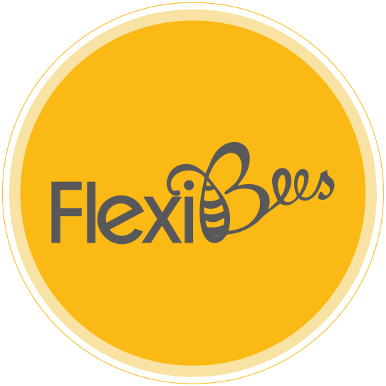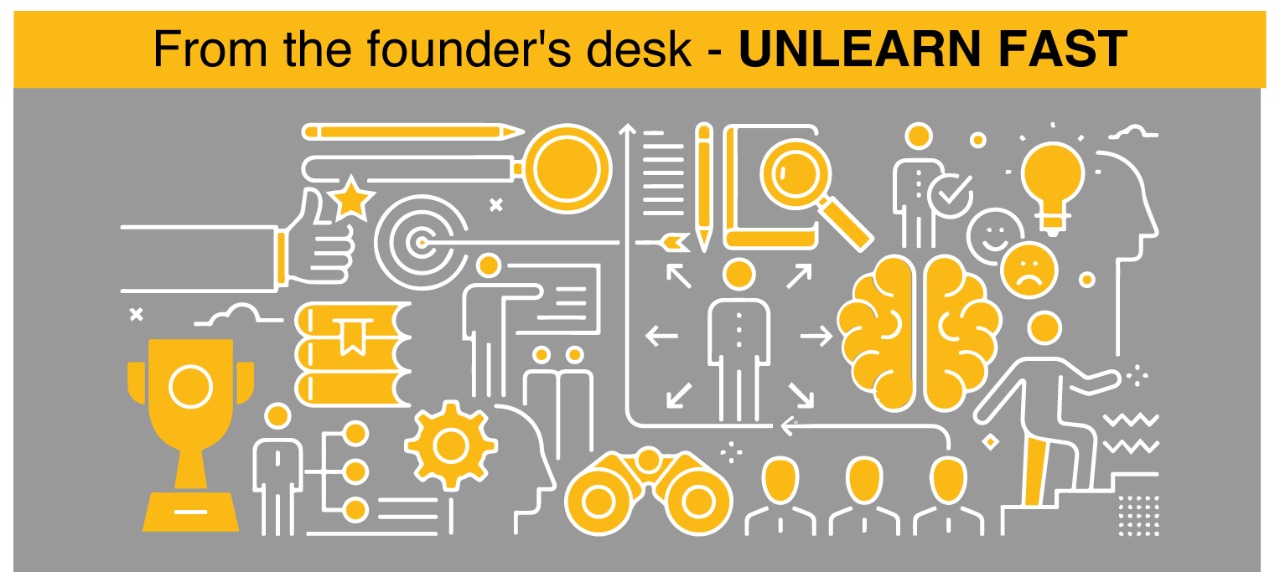From the Founder’s Desk: Unlearn Fast
I started out in finance, thriving in the academic rigour, and expertise-driven achievement that my early career days offered. Post MBA, I transitioned to roles that introduced me to the excitement and messiness of new business research and incubation, lost my professional identity during an unplanned career break, and subsequently became an entrepreneur.
Today, I am very grateful, to be playing my part in helping women reclaim their professional identities, via FlexiBees, a startup, I co-founded with my batchmates from IIMB - Shreya and Rashmi, where we are charged with a vision to create a universe of flexible work options.
Each inflection point in my life added to and subtracted from my identity and world views - around work, relationships, and the roles we play in society.
Having the benefit of hindsight and some grey hairs today, if there was a mantra that I would recommend for managing significant life transitions, it would be to “Unlearn fast”. We often eulogize learning fast, and failing fast, especially in entrepreneurship. Equally if not more important I have realized is to shed learnings that no longer serve the context we are in and make way for more relevant knowledge or ways of living as quickly as possible.
I want to explore here 3 examples in which unlearning has served to be a catalyst for growth.
- If the only tool you have is a hammer...
The biggest benefit of starting out in staff or expertise-driven roles, in my opinion, is the normalization of the ideal. Aiming for the ideal, especially in terms of integrity and work ethic suited my idealistic worldviews and perfectionist tendencies back then.
While this served me well in project-based engagements, once I entered the messy realm of creating impact on the ground, I understood that mastery is not an end in itself. The level of technical expertise to be applied needs to be tailored to the purpose of business, and in the context, it operates in at that time.
For example, while still building the demand for our services, while I was convinced of the need for legally enforceable contracts, ease of execution trumped over the need to build tight contracts that could cover every imaginable possibility. Our contracts started out as being minimally viable as well, and transitioned into tighter ones as we grew, with more use cases and complexity added.
Similarly coming in with wide-ranging functional skills between us, it was important for me and my co-founders to pick and choose elements from Consulting, Sales, Marketing, Branding, Technology and Finance, that served our stage of business as we built it - versus being a canvas for working with our skills pristinely.
A lot can be written about perfection itself and in the constant tug of war, between perfection and progress. I am learning to let go of perfection, in favour of progress.
2. Failure is the stepping stone..
Coming from a culture that celebrated academic ranks and being “ahead of others”, I had not quite grasped the true meaning of the proverb in my early career. I thought, if you failed once, you try again, and harder, until you achieve the goal, and I did that in many instances. I understood the true potential of failure, in my entrepreneurship journey, and I know today that one can truly build something new, only on top of failure.
Failure is essential, and we need to not only “learn from” failure and correct our mistakes, but embrace failure as a way to build and grow. To discover the most effective paths that will lead us to the goal. This mindset is hard to achieve, and the unlearning is not yet complete for me. Finding new paths or even goals via failure can conserve more time and resources in the startup world, than using failure to improve and do better alone.
3. Great minds…
Think alike? Does it mean if we think alike that is a great thing? :)
This has by far been the longest ongoing unlearning of all :) Transitioning from a World of black & white, and “should be s”, learning to accommodate more grey, in situations, differing motivations, as well as personality types of people has led me to question and unlearn old standards around work ethic.
True flexibility is in finding ways to appreciate different skills and strengths that people bring to the table, in their own timezones even, finally all in service of a unified vision. Differences can sometimes cause friction, and even heart-ache but when confronted constructively can bring breakthroughs in human understanding that help us grow.
Unlearning is uncomfortable, and exposes one as a novice, after being regarded as an expert. However, it can reward us with personal growth and is often the only way to do justice to what is needed of us in our ever-changing contexts.


